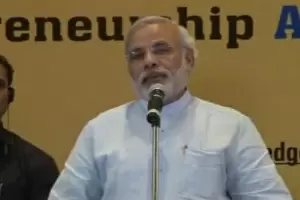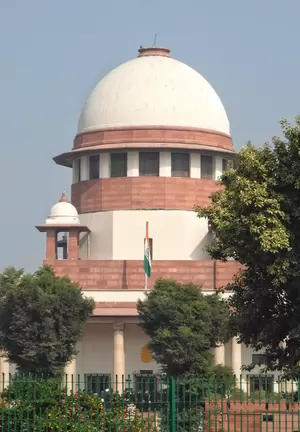Sorry, despite exoneration, Modi cannot play national role

14-April-2012
Vol 3 | Issue 15
Narendra Modi's career provides a classic example of how a kinky ideology can thwart political ambitions in a pluralistic society.
Yet, when the same ideological outlook enabled him to scale the heights of political power by winning the 2002 assembly elections in Gujarat, the chief minister must have presumed that even greater successes were in store for him.
 |
|
Modi may find it hard to realise his dream of becoming Prime Minister because of his past sins
|
What he hadn't taken into account were the imperatives of a multicultural country. Till the 2002 elections, Modi was operating within the parameters of the Bharatiya Janata Party's (BJP) world view based on the concept of cultural nationalism or one nation, one people, one culture.
The obvious similarity of this slogan with Nazi Germany's ein volk, ein Reich, ein Fuehrer (one people, one nation, one leader) underlines the fascistic basis of the idea. But neither Modi nor the BJP was bothered. They believed they were on a roll at the time.
However, it was the jolt of the defeat in the 2004 parliamentary polls, which woke them up to the realities of Indian broadmindedness.
Moreover, Atal Bihari Vajpayee's belief that the 2002 Gujarat riots were responsible for the BJP's defeat two years later might have also induced both Modi and his party to mull over their past policies.
Hence, the chief minister's new emphasis on development for all the people of Gujarat. There was no more mocking of the minorities by him as when he crassly described the camps of riot victims as child-producing factories or took care to pronounce the then chief election commissioner's full name of James Michael Lyngdoh to stress his Christianity, which, according to V.D. Savarkar, is a religion alien to India, like Islam.
But none of it has helped Modi, the man who was described by Ashis Nandy as a "textbook case of a fascist and a prospective killer, perhaps even a future mass murderer". The social commentator was prescient, for the last phrase was used by journalists for the chief minister after the riots.
Indeed, this is the charge he still faces and even after his latest exoneration by the Supreme Court-appointed Special Investigating Team (SIT) - the Nanavati commission had earlier given Modi a clean chit in its interim report - the public perception about his complicity continues.
Because of this belief, even the SIT's report has aroused disbelief with a prominent Muslim resident of Gujarat, J.S. Bandukwala, calling it "compromised".
Of course, no final word has yet been said about Modi's role. Even the SIT report was only about the mob violence in the Gulberg housing society where the former Congress MP, Ehsan Jafri, was killed. The report will now be considered by the trial court while the views of the amicus curiae, Raju Ramachandran, are yet to be made public.
However, the point is not the prolonged legal battles, but the fact that Modi's strenuous attempts from the post-2004 poll results to put the riots behind him haven't cleansed his image.
It has been said that one of the reasons why the outbreak, which he callously described as "stray incidents" although 1,200 people were killed, continues to haunt him is that he has never expressed remorse, as Manmohan Singh has done about the 1984 anti-Sikh riots.
However, even if he does say sorry at some point, it may not make much of an impact for two reasons: one is that the BJP itself remains committed to its "one culture" ideal for India, which emphasises the country's Hindu character to the exclusion of all minority cultures, as in a theocracy.
The other reason is that Modi represents, perhaps because of his grim visage, the type of person who can be expected to implement this sectarian vision. This is the reason why he is a hero to large sections of the saffron brotherhood and is persona non grata to liberals and also groups and individuals in the BJP-led National Democratic Alliance (NDA), who are aware that elections cannot be won without accommodating the minorities.
Modi, then, is fighting a losing battle. Moreover, he has fallen between two stools. He can no longer resurrect his minority-baiting self which he flaunted from the time of the anti-Christian disturbances in Gujarat's Dangs area, where the present terror suspect, Assemananda, was an activist, to the 2004 elections.
And he must have realized by now that all his 'sadbhavna' fasts in aid of social harmony, and all his success in providing bijli, sadak and pani (electricity, roads and water) to the voters, which help other politicians, will not enable him to play a national role, which he apparently intends to do.
The riots, for which the Gujarat high court has castigated the state government, and the demolition of the Babri mosque 10 years earlier, were the fallout of the Hindutva camp's virulent communal propaganda.
While the 1992 act of destruction helped the BJP to attain power at the centre, the 2002 outbreak made the party lose it. Evidently, the square peg of communalism cannot fit into the round hole of a secular democracy. – IANS
Amulya Ganguli is a senior political analyst
















